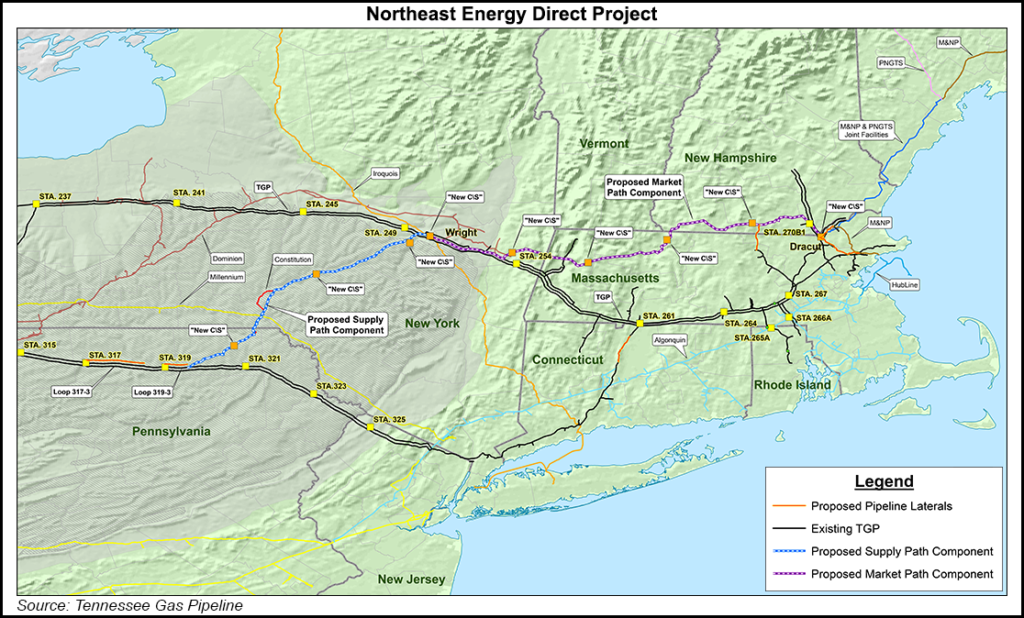Regulatory | Infrastructure | NGI All News Access | NGI The Weekly Gas Market Report
Tennessee Answers NED Queries, Blasts Massachusetts AG
In a voluminous FERC filing Monday, Tennessee Gas Pipeline Co. LLC (TGP) responded to questions from the Commission about its Northeast Energy Direct (NED) project and refuted criticisms that were leveled by the Massachusetts attorney general (AG) against the project in November.

About a month ago, AG Maura Healey cited a study prepared for her office by the Analysis Group and said New England does not need the pipeline capacity envisioned by NED (see Daily GPI, Nov. 18). Immediately after, Kinder Morgan Inc.’s TGP filed with the Federal Energy Regulatory Commission for a certificate for the project (see Daily GPI, Nov. 20).
In its latest filing responding to FERC questions in a Dec. 8 environmental information request, as well as questions from communities in the pipeline path, TGP also argued that the Massachusetts AG is wrong about the project and said the study she relied upon is flawed [CP16-21].
“…Tennessee notes that gas utilities alone in New England are planning on attaining a total of over 1 Bcf of additional gas pipeline capacity by 2018. The current pipeline capacity for all of New England is just under 4 Bcf of gas per day,” wrote TGP Director of Business Development Curtis Cole. “The AG study ignores these statistics and explicitly excludes a consideration of the need for more pipeline capacity by gas utilities. The AG study further finds that more pipeline capacity for power generators is not necessary because New England’s power market can use oil backup and liquefied natural gas (LNG) to a greater extent for peak days in the winter months.
“This conclusion ignores the fact that New England generators are more dependent on natural gas pipeline capacity to generate baseload electricity in recent years, and that going forward, with nuclear retirements such as Vermont Yankee and Pilgrim, natural gas’s role as a baseload fuel likely will only increase. The AG study further ignores the high cost New England consumers currently pay for energy and the economic benefit that relatively low-cost, clean natural gas would bring to the region.”
Cole wrote that TGP is still evaluating the study and would have more to say “in the near future.”
Elsewhere in the document, Cole again addressed the need for NED. “Limited natural gas transportation infrastructure also has led to extremely high electricity prices in the northeast U.S., and threatens the reliability of the region’s electric grid,” he wrote. “For example, National Grid received approval to increase its customers’ electric rates by an average of 37% for winter 2014-2015 due to ‘continued constraints on the natural gas pipelines serving the region, which decrease natural gas availability at times of peak demand, causing some generators to buy gas on the spot market at higher prices, switch over to alternate fuels, or not run at all.'”
Among numerous questions to which it responded, TGP addressed concerns about the potential for property values to be harmed by the siting of nearby pipeline compressor stations.
“Tennessee is not aware of any instances of a decrease to property value or the inability of a homeowner to obtain a mortgage for a property in the vicinity of a compressor station,” wrote Jim Hartman, pipeline senior right-of-way agent. “There are dozens of existing compressor stations along Tennessee’s existing system in the northeast U.S., and many individuals have bought, sold, and built homes immediately in the vicinity of compressor stations.”
Other comments/concerns to which TGP responded related to noise, environmental justice communities, communication with and training of first responders, greenhouse gas emissions reduction and project financing, among others.
© 2024 Natural Gas Intelligence. All rights reserved.
ISSN © 1532-1231 | ISSN © 2577-9877 | ISSN © 1532-1266 |
